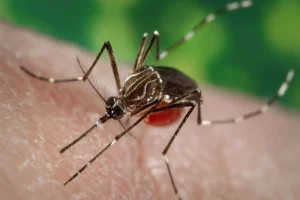
Dengue, a mosquito-borne virus, has seen a global resurgence, particularly after the COVID-19 pandemic, prompting increased concern in the United States.
This year, the U.S. faces a heightened risk of dengue, a viral infection spread by mosquitoes that currently has no approved antiviral treatment. The Centers for Disease Control and Prevention (CDC) issued a warning this week, urging healthcare providers and the public to remain vigilant.

Global Dengue Surge
“Global incidence of dengue in 2024 has reached the highest levels ever recorded for a calendar year,” the CDC announced in its health advisory. “Countries in the Americas have reported a record-breaking number of dengue cases in 2024, surpassing the highest annual totals ever recorded.”
Following the COVID-19 pandemic, dengue has resurged on a global scale, according to the CDC. In 2023, over 4.6 million cases and 4,000 deaths were reported across the Americas. Alarmingly, within the first six months of 2024 alone, more than 9.7 million cases have been reported—more than double the total for the previous year.

The CDC advised healthcare providers to “increase their suspicion of dengue in patients presenting with fever who have been in areas with frequent or continuous dengue transmission within the two weeks before the onset of illness.”
Understanding Dengue
Dengue viruses are primarily spread through the bites of infected mosquitoes and do not transmit from person to person.
Most dengue cases in the U.S. are linked to travelers who were infected elsewhere. The CDC noted, “U.S. summer travel often coincides with periods of heightened dengue activity in many countries.”
However, local transmission does occur in the U.S. Limited local spread of dengue has been reported in states such as Florida, Hawaii, Texas, Arizona, and California. So far this year, eight local cases have been confirmed in Florida. Despite these incidents, the CDC emphasized that the risk of widespread dengue transmission in the continental U.S. remains low.
Six U.S. territories and freely associated states are classified as areas with frequent or continuous dengue transmission, including Puerto Rico, American Samoa, and the U.S. Virgin Islands. Puerto Rico has already reported nearly 1,500 cases this year and has declared a public health emergency due to the dengue outbreak.
Causes of Dengue Resurgence
Dengue transmission often peaks during the warmer, wetter months in many tropical and subtropical regions. A warming climate, driven by climate change, is expected to facilitate the broader spread of the mosquitoes that transmit dengue, according to the CDC.
“Dengue cases are likely to increase as global temperatures rise,” the CDC stated. “Higher temperatures can expand the range of the mosquitoes that spread dengue, as well as accelerate viral amplification in mosquitoes, increase mosquito survival rates, and alter reproduction and biting patterns.”

Preventing Dengue
The best way to prevent dengue is to avoid mosquito bites. The CDC recommends using insect repellent and wearing loose-fitting, long-sleeved clothing.
Symptoms of Dengue
Dengue symptoms typically begin within two weeks of being bitten by an infected mosquito and usually last between two and seven days.
Approximately 1 in 4 people infected with dengue will experience symptoms, most of which are mild and resolve within about a week. However, dengue can cause severe illness, and there are currently no antiviral medications approved for its treatment.
Symptoms can range from mild to severe and may include fever accompanied by:
- Eye pain
- Muscle pain
- Bone pain
- Joint pain
- Headache
- Nausea/vomiting
- Rash

Severity of Dengue
About 1 in 20 people who contract dengue will develop severe symptoms, which can be life-threatening. Severe dengue is a medical emergency, with symptoms that can develop within hours of infection. Complications can include shock, internal bleeding, and death.
The CDC advises anyone experiencing severe symptoms to seek immediate medical attention. These symptoms include:
- Severe abdominal pain or tenderness
- Persistent vomiting (at least three times in 24 hours)
- Bleeding from the nose or gums
- Vomiting blood or passing blood in the stool
- Feeling extremely tired or restless

Rising Dengue Cases in the U.S.
On Tuesday, the CDC issued a warning to healthcare providers to be on alert for dengue cases. A global surge in dengue cases is raising the risk of infections within the U.S.
Historically, dengue has been relatively rare in the continental U.S., with most cases linked to travel to areas where the disease is more prevalent. However, the CDC reported that a higher-than-expected number of dengue cases have been identified among U.S. travelers this year, with 745 cases documented through June 24.
In 2023, there were 1,829 travel-associated dengue cases reported by U.S. travelers, marking the highest number of such cases since dengue became a reportable disease in the U.S. in 2010. Twenty-three countries experienced dengue outbreaks last year, with over 5 million cases and 4,000 deaths reported in the Americas alone.

Ongoing Challenges and Prevention
The CDC’s warning underscores the importance of testing patients who present symptoms resembling dengue, particularly those who have recently traveled to areas where the disease is common.
Symptoms typically start about a week after being bitten by an infected mosquito, although 40-80% of infections are asymptomatic, according to the Infectious Disease Society of America (IDSA).
Warning signs that dengue is progressing to a more severe form of the disease include persistent vomiting, fluid accumulation, bleeding from the nose or gums, liver enlargement, fatigue, and abdominal pain.
Severe dengue can lead to severe bleeding, respiratory distress, organ failure, and death. Mortality rates can reach as high as 13% in untreated patients, the IDSA noted.
Infants, pregnant individuals, the elderly, and those with certain underlying medical conditions are at increased risk for severe dengue. Other than supportive care—such as fluid replacement and rest—there are no specific treatments for dengue.

While there is no dengue vaccine recommended for travelers or adults, the public health departments in Puerto Rico are still administering Dengvaxia to children aged 9 to 16 years with a lab-confirmed case who live in areas with frequent transmission. These doses will remain available until they expire in 2026.
In response to the growing dengue caseload, the CDC launched an emergency response earlier this year, expanding lab capacity and working with local leaders to strengthen disease surveillance.
To prevent dengue, the CDC recommends using bug spray when outdoors, particularly when traveling to regions where dengue is common. Wearing loose-fitting, long-sleeved shirts and pants, running air conditioning, and using window screens can also help keep mosquitoes at bay.



